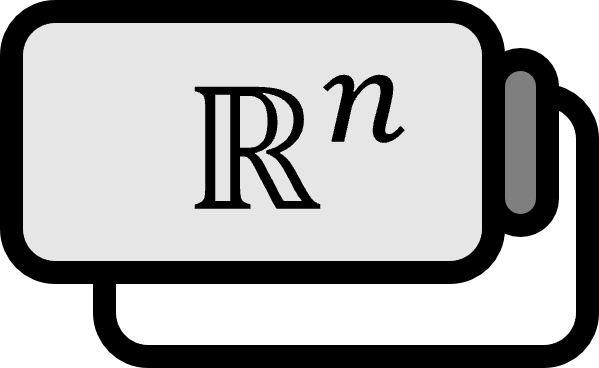Integration of Vector-Valued Functions
Definition1
Let $f_{1}$, $f_{2}$, $\dots$, $f_{k}$ be functions taking real values on the interval $[a,b]$. And suppose $\mathbf{f} : [a,b] \to \mathbb{R}^{k}$ is defined as follows.
$$ \mathbf{f}(x)=\left( f_{1}(x),\dots,f_{k}(x) \right),\quad x\in [a,b] $$
If each $f_{k}$ is integrable on the interval $[a,b]$, then the integral of $\mathbf{f}$ is defined as follows.
$$ \int _{a} ^{b} \mathbf{f}dx = \left( \int _{a} ^{b}f_{1} dx, \dots, \int _{a} ^{b}f_{k} dx \right) $$
Theorem
The results established for functions previously satisfying $f : [a,b]\to \mathbb{R}$ hold true as they are.
Fundamental Theorem of Calculus Part 2
Suppose for a vector-valued function $\mathbf{f}, \mathbf{F} : [a,b] \to \mathbb{R}^{k}$, $\mathbf{f}$ is integrable and $\mathbf{F}^{\prime}=\mathbf{f}$ holds. Then the following equation applies.
$$ \int _{a} ^{b} \mathbf{f}(t)dt = \mathbf{F}(b)-\mathbf{F}(a) $$
The Absolute Value of an Integral is Less Than the Integral of the Absolute Value
$$ \begin{equation} \left| \int _{a} ^{b} \mathbf{f}dx \right| \le \int _{a} ^{b} \left| \mathbf{f} \right| dx \label{eq1} \end{equation} $$
Proof
If $\mathbf{f}=\left( f_{1},\dots,f_{k} \right)$, then the following is true.
$$ \left| \mathbf{f} \right| =\left( f_{1}^{2}+\cdots +f_{k}^{2} \right)^{1/2} $$
Since integration is linear, and the product of functions preserves integrability, each $f_{i}^{2}$ and their sum is also integrable. Also, since $x^{2}$ is continuous on the compact set $[a,b]$, $x^{1/2}$ is continuous too, and being continuous, it’s integrable. The composition of continuous functions preserves integrability, thus the following holds. $\left| \mathbf{f} \right|$ is integrable.
To demonstrate $\eqref{eq1}$, let’s assume the following.
$$ \mathbf{y} = \left( y_{1},\dots,y_{k} \right) \quad \text{and} \quad y_{i}=\int f_{i}dx $$
Then, the following is true.
$$ \mathbf{y} = \left( y_{1},\dots,y_{k} \right) = \left( \int f_{i}dx, \dots, \int f_{k}dx \right) = \int \mathbf{f}dx $$
Moreover, we obtain the following.
$$ \left| \mathbf{y} \right| ^{2} = \sum \limits _{i=1} ^{k}y_{i}^{2} = \sum \limits _{i=1} ^{k}y_{i}\int f_{i}dx = \int \left( \sum \limits _{i=1} ^{k}y_{i}f_{i} \right) dx $$
Then, by the Cauchy-Schwarz Inequality, the following applies.
$$ \sum \limits _{i=1} ^{n} y_{i}f_{i}(t) \le \left| \mathbf{y} \right| \left| \mathbf{f}(t) \right|, \quad a\le t \le b $$
Thus, when $\left| \mathbf{y} \right| \ne 0$, the following is true.
$$ \begin{align*} && \left| \mathbf{y} \right| ^{2}\le \int \left| \mathbf{y} \right| \left| \mathbf{f} \right| dx \\ \implies && \left| \mathbf{y} \right| \le \int \left| \mathbf{f} \right|dx \\ \implies && \left| \int \mathbf{f}dx \right| \le \int \left| \mathbf{f} \right|dx \end{align*} $$
Of course, $\left| \mathbf{y} \right| =0$ is trivially true.
■
Walter Rudin, Principles of Mathmatical Analysis (3rd Edition, 1976), p135-136 ↩︎
